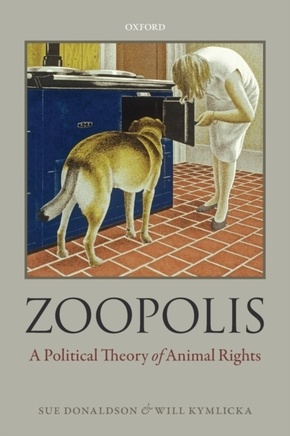Zoopolis, English edition - A Political Theory of Animal Rights
| Verlag | Oxford University Press |
| Auflage | 2013 |
| Seiten | 352 |
| Format | 14,4 x 22,3 x 1,8 cm |
| Gewicht | 530 g |
| Artikeltyp | Englisches Buch |
| ISBN-10 | 0199673012 |
| EAN | 9780199673018 |
| Bestell-Nr | 19967301EA |
Massentierhaltung, Fleischskandale, Tierversuche unser Umgang mit Tieren ist längst kein Nischenthema mehr, für das sich lediglich Aktivisten oder Ethiker interessieren, sondern steht im Fokus breiter öffentlicher Debatten. Allerdings konzentrieren sich die Diskussionen zumeist auf Fragen der Moral, darauf, welche moralischen Rechte und Interessen wir Tieren aufgrund ihrer Eigenschaften und Fähigkeiten zum Beispiel Schmerzen zu empfinden zuschreiben müssen und welche moralischen Pflichten sich daraus für uns ergeben.
Sue Donaldson und Will Kymlicka gehen weit darüber hinaus und behaupten, dass Tiere auch politische Rechte haben. Im Rückgriff auf avancierte Theorien der Staatsbürgerschaft argumentieren sie dafür, ihnen neben unverletzlichen Grundrechten einen je gruppenspezifischen politischen Status zuzusprechen. Das heißt konkret: Bürgerrechte für domestizierte Tiere, Souveränität für Gemeinschaften von Wildtieren sowie ein "Stammgastrecht" für jene, die zwar nicht domestizie rt sind, aber in unmittelbarer Nachbarschaft zu uns leben.
"Zoopolis" macht auf so kluge wie eindringliche Weise ernst mit der Tatsache, dass wir mit den Tieren untrennbar verbunden sind. Elegant und keineswegs nur für Spezialisten geschrieben, entwirft es eine neue, folgenreiche Agenda für das künftige Zusammenleben mit diesen Geschöpfen, denen wir mehr schulden als unser Mitleid. Das Tier, so sagt dieses Buch, ist ein genuin politisches Wesen. Wir schulden ihm auch Gerechtigkeit.
Zoopolis offers a new agenda for the theory and practice of animal rights. Most animal rights theory focuses on the intrinsic capacities or interests of animals, and the moral status and moral rights that these intrinsic characteristics give rise to. Zoopolis shifts the debate from the realm of moral theory and applied ethics to the realm of political theory, focusing on the relational obligations that arise from the varied ways that animals relate to humansocieties and institutions. Building on recent developments in the political theory of group-differentiated citizenship, Zoopolis introduces us to the genuine "political animal". It argues that different types of animals stand in different relationships to human political communities. Domesticated animalsshould be seen as full members of human-animal mixed communities, participating in the cooperative project of shared citizenship. Wilderness animals, by contrast, form their own sovereign communities entitled to protection again st colonization, invasion, domination and other threats to self-determination. "Liminal" animals who are wild but live in the midst of human settlement (such as crows or raccoons) should be seen as "denizens", resident of our societies, but not fully included in rightsand responsibilities of citizenship. To all of these animals we owe respect for their basic inviolable rights. But we inevitably and appropriately have very different relations with them, with different types of obligations. Humans and animals are inextricably bound in a complex web of relationships,and Zoopolis offers an original and profoundly affirmative vision of how to ground this complex web of relations on principles of justice and compassion.
Rezension:
In this careful, thoughtful, and engaging work, Sue Donaldson and Will Kymlicka affirm and extend the attribution of rights to animals. ... The book is thoroughly researched and engages a lot of literature about animals, both philosophical and sociological Ruth Abbey, Philosophy in Review

